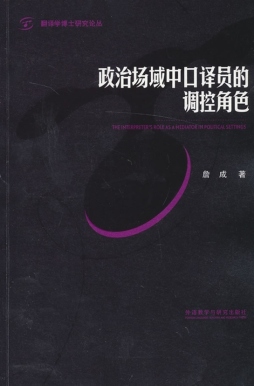政治场域中口译员的调控角色
出版社:外语教学与研究出版社
年代:2013
定价:49.9
书籍简介:
本书基于语料库,针对中国政治语境下政府机构译员的角色进行实证研究。本书关注此前研究较为忽视的在政治场域中开展的对话口译活动,旨在考察政治会谈的交替传译中译员如何与交际各方互动,以及译员如何通过理解、加工和调控政治场域中的话语,来发挥其角色作用。
作者介绍:
书籍目录:
List of Diagrams
List of Tables
Chapter 1 Setting the Scene for This Research
1.1 Rationale of Research
1.2 Research Objective
1.3 Significance of Research
1.3.1 Understanding the social face of the interpreting profession
1.3.2 Enriching academic research on interpreting
1.4 Research Scope
1.4.1 Consecutive interpreting
1.4.2 Political settings
1.4.3 Government staff interpreters
1.4.4 Guangdong Province
1.4.5 Role
1.5 Research Methodology
1.5.1 DI paradigm and methodologies in interpreting studies
1.5.2 Descriptive study of interpreting
1.5.3 Critical discourse analysis of interpreted events documented in corpus
1.6 Thesis Organization
Chapter 2 Previous Literature and Theoretical Framework
2.0 Chapter Overview
2.1 Describing CI Activities in Sociocultural Interactional Contexts
2.2 Translation as Re-writing and Its Relevance to Interpreting
2.2.1 The Re-writing Theory in translation studies
2.2.2 Applying the Re-writing Theory to interpreting studies
2.3 Research on Ideology and Mediation in Translation and
Interpreting
2.3.1 Ideology and mediation in translation activities
2.3.2 Ideology and mediation in interpreting activities
2.3.3 Ideology and mediation--a summary
2.4 Research on the Role of the Interpreter
2.4.1 The interpreter's role as an important topic of research
2.4.2 The interpreter's role in various settings of the profession
2.4.3 Going beyond previous research---a summary
2.5 Critical Discourse Analysis of Interpreter-mediated Encounters
2.5.1 The power of critical discourse analysis
2.5.2 Adopting critical discourse analysis in interpreting studies
2.5.3 Critical discourse analysis--a framework for analysis
2.6 Theoretical Framework of This Research
2.7 Summary of This Chapter
Chapter 3 Analyzing CI in Political Settings with a Parallel Corpus
3.0 Chapter Overview
3.1 Constructing a Corpus for This Research
3.1.1 Some background features of interpreter-mediated political meetings
3.1.2 Source of the corpus data
3.1.2.1 Meetings to be studied
3.1.2.2 Collection of the data
3.1.3 Selection of the corpus data
3.1.3.1 The primary parties of communication
3.1.3.2 The time span of the meetings
3.1.3.3 The languages used in the meetings
3.1.3.4 The interpreters involved
3.1.3.5 The pattern of turn-taking in the meetings
3.1.4 Preparing the data for analysis
3.1.4.1 Transcription of the data
3.1.4.2 Documentation and calculation
3.2 Exploring “Shifts” in the Interpreted Texts
3.3 Presenting Corpus Data upon Quantitative Analysis
3.4 Summary of This Chapter
Chapter 4 Shifting Personal Angles in the (Re-)Narration of
“Self” and the “Other”
4.0 Chapter Overview
4.1 Interpreting Political Encounters as a Process of (Re-)Narration
4.2 Questioning the Interpreter's Identity as a Non-person
4.3 Shifts in Personal Angles---Case Analysis
4.3.1 First person vs. third person as the constructing of“Us”
4.3.1.1 First person angle to third person angle
4.3.1.2 Third person angle to first person angle
4.3.2 Second person vs. third person as the constructing of the
“Other”
4.3.2.1 Second person angle to third person angle
4.3.2.2 Third person angle to second person angle
4.3.3 Singular vs. plural as a reference to the collective community
4.3.4 Animate vs. non-animate as a reflection of the knowledge
system
4.3.4.1 Animate subject to non-animate subject
4.3.4.2 Non-animate subject to animate subject
4.3.5 Shifting the speaking subject as a way of active mediation
4.4 Interpreters' Perception and Projection of the “Self”
4.4.1 The idealized interpreter vs. the actual interpreter
4.4.2 How professional interpreters understand their multiple
identities
4.5 Summary of This Chapter
Chapter 5 Managing and Mediating Discourse Through Shifts in Interpreted Political Meetings
5.0 Chapter Overview
5.1 Interpreting Political Meetings as an Act of Mediation
5.2 Levels of Renditions Examined in the Corpus Data
5.3 Extended Renditions
5.3.1 Addition of hedges
5.3.2 Explicitations with context
5.3.3 Means of Advocacy
5.4 Substituted Renditions
5.4.1 Shifts in speech acts
5.4.2 Modality changes
5.4.3 Interventions from presupposed knowledge
5.5 Reduced Renditions
5.5.1 Information filtering
5.5.2 Cultural broking
5.6 Para-discourse on Interpreter Mediation in Political Settings
5.7 Summary of This Chapter
Chapter 6 The Interpreter's Voice in Political Meetings
6.1 Research Findings
6.2 The Voice of the Interpreter--Conclusion of This Research
6.3 Implications of This Research
6.3.1 Descriptive study of actual interpreting in its context
6.3.2 Interpreting activities examined with social and cultural theories
6.3.3 Analysis with a parallel corpus of interpreting of political meetings
6.3.4 Practice, training and development of the profession
6.4 Limitations of This Research
6.5 Suggestions for Future Research
Bibliography
Appendix
后记
内容摘要:
《政治场域中口译员的调控角色》首先采用文献计量法和归纳法,系统梳理国际范围内对译员角色研究的发展历史、研究主题和研究方法;然后对广东省人民政府机构译员的真实口译工作进行描写、建构平行语料库;再运用批评性话语分析的方法对语料进行定性研究,考察了口译过程中不同层次的“偏移” 现象,如零转换、概括转换、缩减转换、替代转换和扩展转换,分析政府机构译员在政治会谈口译中,如何通过人称转换、信息增减、交际功能调整等,对话语内容进行调控。《政治场域中口译员的调控角色》由詹成所著。
编辑推荐:
《政治场域中口译员的调控角色》选题视角和研究内容新颖独特,将政治场域中开展的交替传译活动作为一种由译员调控的话语进行考察,通过对真实语料的描写分析,质疑了关于“译员是讲话人忠实回声”的传统观念,认为译员是具备本体意识并且能够发挥调控角色显现自身态度的个体。该研究所体现出的包括“忠实性”、口译质量、译员角色、翻译伦理等一系列理论问题都非常重要。
书籍规格:
| 书籍详细信息 | |||
| 书名 | 政治场域中口译员的调控角色站内查询相似图书 | ||
| 丛书名 | 翻译学博士研究论丛 | ||
| 9787513530194 《政治场域中口译员的调控角色》pdf扫描版电子书已有网友提供资源下载链接,请点击下方按钮查看 | |||
| 出版地 | 北京 | 出版单位 | 外语教学与研究出版社 |
| 版次 | 1版 | 印次 | 1 |
| 定价(元) | 49.9 | 语种 | 简体中文 |
| 尺寸 | 23 × 16 | 装帧 | 平装 |
| 页数 | 264 | 印数 | |
书籍信息归属:
政治场域中口译员的调控角色是外语教学与研究出版社于2013.4出版的中图分类号为 H315.9 的主题关于 政治学-英语-口译-研究 的书籍。
